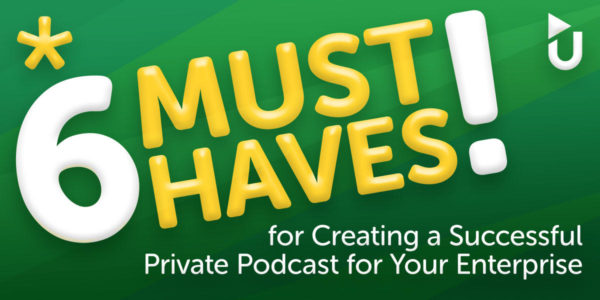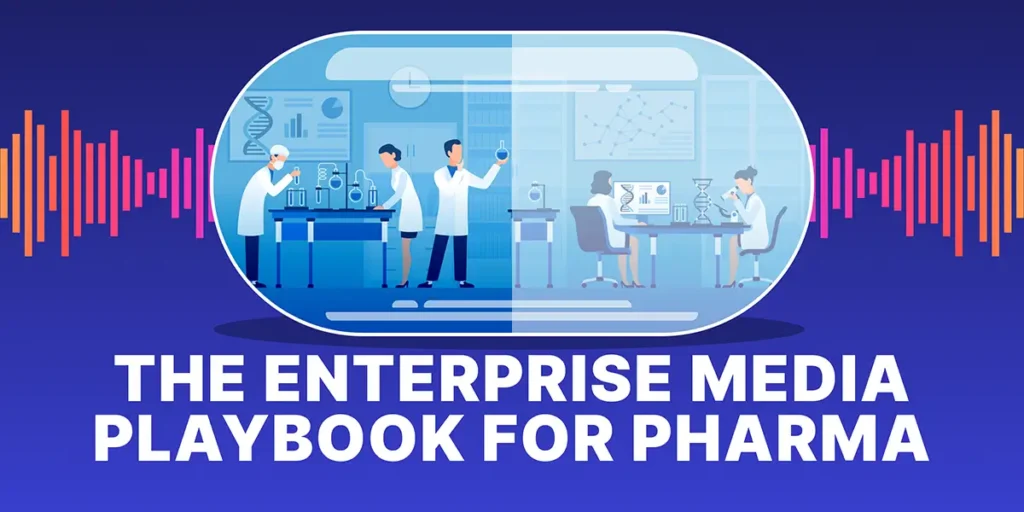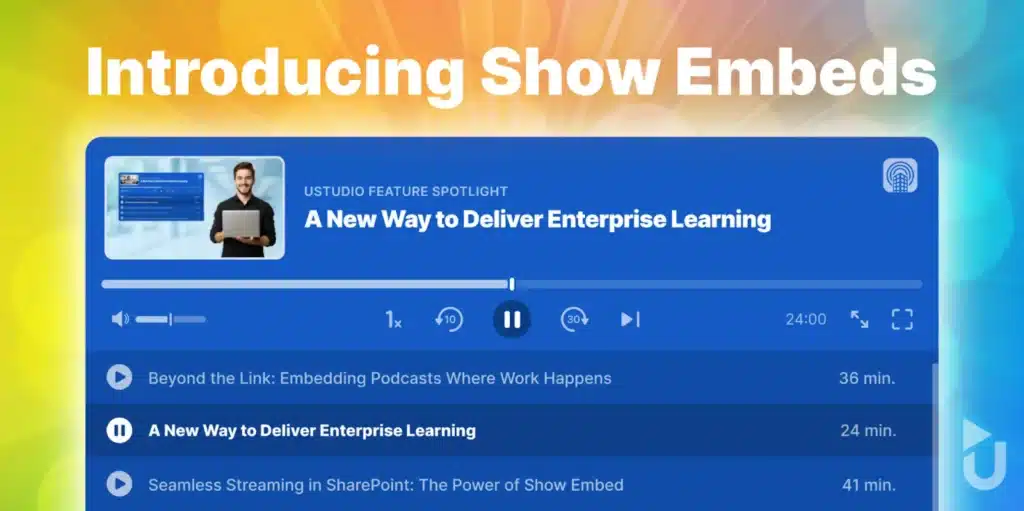6 Must Haves For Creating a Successful Enterprise Private Podcast
Jackie Logan | Podcasting

Now more than ever, efficient, engaging communication is vital, and enterprise private podcasting has quickly become a preferred tool for companies looking to connect with employees on a deeper level. By implementing a secure, private podcast platform, organizations can streamline tasks, reduce costs, and enhance employee training and engagement.
Private podcasts cut through the noise of traditional intranets and emails, offering a convenient way to share essential information, from company updates to professional development, directly with employees. Knowing that up to 71% of employees say they don’t read company emails, it’s no wonder companies are looking for a better communication channel.
The best enterprise private podcasting solutions help businesses connect with employees across locations and devices, ensuring they can access valuable content when it suits them.
However, while creating a private podcast for your enterprise can be simpler than expected, a few essential steps are needed to maximize its impact. From robust security measures and detailed analytics to a well-planned content and promotional strategy, these elements ensure that your private podcast is not only secure but also engaging and accessible to the right employees.
Here, we outline six critical components to help you create a successful private podcast for your enterprise, allowing your organization to make the most of this innovative communication channel.
6 Must-Haves for a Successful Enterprise Private Podcast
#1: Multi-Tier Security Capabilities
To create a successful enterprise private podcast, you need to be confident that your business messages stay secure. This means going beyond the password protection that many providers offer.
It’s critical to protect the embedded media players, as well as the stream itself, to ensure private podcasts are only playable when initialized inside of the location for which they were intended. Businesses can quickly authenticate users using SSO (or other authentication protocols) and restrict access by departments, seniority, location, and more to make sure content is effectively targeted and always remains in the correct hands.
#2: Detailed Analytics
As with any technology or communication medium you implement in your workforce, you’ll want to measure how it is performing. Enterprise private podcasting is no different.
It’s important to observe how your employees are consuming and reacting to your podcast so that you can realize if changes need to be made within your content, thus making it as successful as it can be. Are you promoting your program well enough to bring in new active users? Did listeners share or download a particular episode? Analytics can give you answers to these questions and more. Choose a private podcasting partner that offers insightful listening data, named-user data, adoption data, engagement data and live streaming data to make sure all of your bases are covered.

#3: A Content and Promotional Plan
Promoting your enterprise private podcast is one of the most important steps to audience engagement and is key to its success within your enterprise. If your employees don’t know the podcast exists, how are they going to listen?
The good news is that it’s much easier than you might think. From leveraging internal champions within your business to embedding share links there are many ways to promote your private podcasts to your employees. A promotional calendar can be a nice tool to plan out your promotions and remind you to frequently boost your content.
Programming your podcasts is a cinch. Podcasts can simply slot into your overall training or communication calendar next to the content you are already producing for your company. Adding podcasts to your strategy will greatly amplify your messaging reach, frequency and engagement.
Consistency is also important for your private podcast to be successful. Think about your favorite podcast show - you’re pretty bummed when producers randomly take a break with no notice and the show comes to a halt, right? A predictable show frequency and length is a great way to establish listener expectations and habits. When your audience knows exactly when to expect the next podcast episode, they will be more inclined to tune in and listen in a timely manner.
A best practice is to have the first three months of content planned by the time your podcast launches. It’s best to launch your podcast episode within a particular show at a consistent frequency, day and time. To make it even faster, you can download templates for your own planning purposes.
#4: Engaging Content and Platform Capabilities
Engaging content is essential for a successful podcast. While creating content can be quite daunting at first, we have found that once you push through any initial concerns, it can be quite simple and straightforward to deliver engaging, valuable content to your audience. Consider if you have any pre-existing assets that can be converted into a podcast episode. uStudio customers also have great success interviewing employees and company leaders via private podcast episodes.
Choose a platform that offers video podcasting and live audio podcasting capabilities for the greatest flexibility to help make your content engaging and successful. With live audio podcasting, shows are broadcast live to your audience through your provider’s private application, which is listening as you record your audio. Live audio lets you move fast, removing the friction that recording sessions or live in-person events create.
Video podcasting is great for enterprise training purposes to show PowerPoints and hands-on demonstrations. Gestures and body language are also helpful for getting your emotions across and developing a stronger relationship between listener and host. And if you are pushing your employees to consume your content via desktop, video podcasting could be the way to go. However, when it comes to choosing the right format for your organization’s private podcast, there is no “one size fits all'' solution and it is dependent on what your goals are for your program.
#5: A Strong End User Experience
Your podcast adoption rate will depend largely on your end-user experience. To create a successful enterprise private podcast, it’s important to opt for a true podcasting provider with an intuitive interface.
Your employee’s podcasting experience with the streaming platform should be similar to consumer podcasting players they already know and love, like Apple Podcasts or Spotify. With no new habits to learn, the ease of our technology supports employee adoption. Follow a subscription-based program so that no effort is needed for your listeners to find appropriate content.

Another essential feature of a media streaming platform is the ability to group and segment audiences. This capability allows private podcast admins to restrict access and produce personalized material to different pillars within your organization.
The private podcast end user will feel more in control and more important, as they have podcast content that’s just for them. All changes to podcast shows and episodes are automatically updated across all users’ applications, no matter the device.
#6: Leadership Support
In many cases, your private podcast will fail unless it has the support to grow within your enterprise. One of the best ways to improve your enterprise private podcast adoption rates is to gain leadership support and communicate that throughout your organization.
Your employees will listen to their direct boss more than most other groups within the company - that is why it is important for them to promote your podcast content within their teams. When it comes to asking for leadership support, make sure to include the value that the podcasts will provide their team and why it’s something many companies are investing in.
Maximizing the Impact of Your Enterprise Private Podcast
A well-executed enterprise private podcast offers companies a powerful communication tool that is both secure and adaptable to employee needs. By prioritizing elements like multi-tier security, engaging content, and a seamless user experience, your organization can create a podcast that employees will look forward to each week. Not only does this strengthen company culture and foster a sense of connection, but it also enhances productivity by delivering information in a format that is accessible and convenient.
With features like video podcasting, live streaming, and detailed analytics, enterprise podcast solutions make it easy to tailor content to specific audiences and measure its impact, helping you continually improve and evolve your program.
As more companies embrace private podcasting, those with the right tools and strategic approach will stand out. If your team is ready to leverage podcasting as a central part of your internal communication strategy, uStudio offers a comprehensive platform tailored to enterprise needs. Creating a successful enterprise private podcast for your enterprise is easier than it seems, especially when you opt for an expert platform that offers free educational resources to help you grow. Schedule a uStudio demo today.
I am an experienced Go-to-Market and product development leader of SaaS solutions across several industries, both commercial and government. I blend creativity, strategy, and research to launch and evolve products with a knack for asking the right question at the right time to expose unspoken market needs. I leverage my crisp communication skills to organize cross functional teams, manage high-profile client success, and publish public-facing product marketing material.


